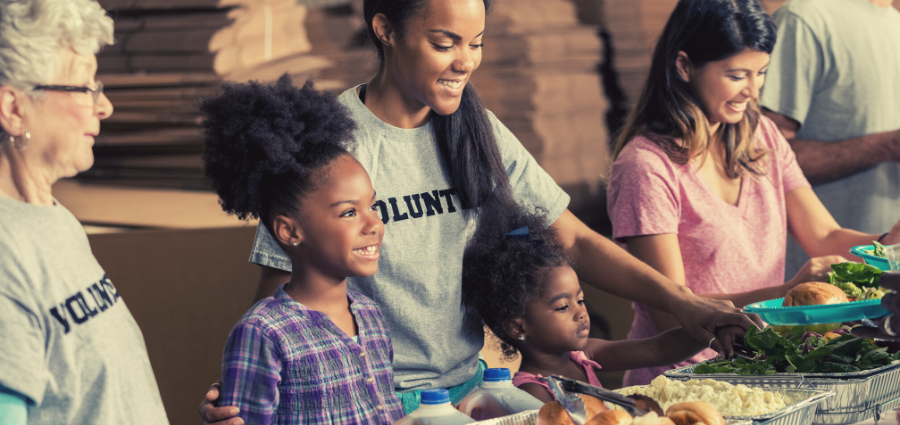
Helping Children to Love the Poor
corporal works of mercy | family life
To love our neighbor, means to open our hearts to all people, including the hungry, thirsty, homeless, truly anyone is need. I’m afraid that, for much of my life, I didn’t love them very much. Of course, I’d pray for them, but I had little direct interaction with those living in poverty.
Kinds of Hunger
Then I began working in Youth Ministry and taking a group of teens to a nearby soup kitchen. There I observed a strange phenomenon. Those running the soup kitchen prepared the food in the kitchen and served each individual portion onto a tray. As the men and women came in, they took a seat at a table, and someone brought them a tray. The organizers then remained in the kitchen, chatting among themselves while the guests remained in the other room, eating … mostly in silence. I felt a division between those who served and those being served, and it unsettled me.
One day, after bringing out a tray, instead of returning to the kitchen, I took a seat next to the older man at the table. He was probably in his seventies, and I remember his old, grungy green coat. But even better I remember his smile as it lit up when I asked him his name and how his day was going. We chatted for the rest of the time.
After that day, I told my teens that, after they had served the food, they should have a seat among the guests. We intermingled and conversed. Afterward, the teens and I gathered outside on the city sidewalk and shared our observations. Mike, a reflective look on his face, quietly commented, “They just wanted someone to listen to them.”
Yes, there was hunger here—hunger for food, but also for a listening ear, a welcoming smile, and an honest concern.

The Beggar on the Street
That all happened in my former life. Now I’m a mother. How do I, in this new role, love the poor? How can I help my children do the same?
As we make our weekly drive to my parents’ house for a visit, we pass a beggar on the street. He holds a cardboard sign: “Homeless. Anything Helps. God bless you.” The air here in New York is frigid this time of year and he stands on his solitary, cold island among the lanes of traffic.
My 5-year-old notices him and asks what he’s doing. I explain that the man has no home and is looking for someone to give him money. Without a moment’s hesitation, she tells me to stop and give him some.
In contrast, hesitation fills me. I’m a single woman driving a van full of children. Do I feel safe opening my window to this man? Don’t I warn my children about stranger danger? If I give this man money, how will I know that he won’t spend it on alcohol or cigarettes … or even worse?
So, I drive past the homeless man, and I feel guilty. Is this loving the poor?
Ways to Love the Poor
I didn’t feel comfortable giving money to the beggar on the street that day. But this doesn’t mean that there aren’t other means of loving the poor. Here are some of the ways we have found to help our children help those in need:
- We donate money monthly to a local food pantry. As we drove away from that homeless man on the street, I explained to my kids that we do give money to the poor, just in a different manner.
- We visit the food pantry to make physical donations. Our kids don’t see our online donations each month, but they do know the experience of picking food out of our family pantry, putting it into bags, and delivering it to the food pantry. They remember the woman’s face at the reception desk, full of gratitude for their donation of boxes of cereal and cans of soup. We try to make it tangible for our children.
- We encourage our children to put loose change into the poor box at church, so they make a contribution out of their funds as well.
- I didn’t feel comfortable handing money to the homeless man on the street, but I still wanted to give something. One week my daughter and I put together a brown paper bag for him, filled with a sandwich, homemade cookie, and fruit. She also wrote a little note telling him we would pray for him. As we stopped at the exit, I rolled down my window and handed him the brown bag, much to his surprise and my daughter’s delight!
.png?width=1080&name=20220214%20CSpellman%202%20(1).png)
- We teach our children about the poor. Sometimes I might hear one of my children exclaim, “I’m starving!” I take that opportunity to gently explain that there really are people out there who are literally starving. We are not those people, and we shouldn’t use phrases like that. When a child balks at eating something on his or her plate, I explain that there are boys and girls right now who literally have nothing to eat. We should be grateful for what we have and not waste our food, even if it’s not our favorite meal to eat.
- We find ways to make it personal. Our children are still relatively young, and I don’t feel comfortable bringing them to serve at a soup kitchen yet. I do, however, desire them to have that personal connection, to make the intangible “poor” a very tangible name and face. We found that sponsoring children through Unbound has made this possible. Rajeswari in India and Cristopher in Honduras are extended members of our family: their pictures decorate our fridge door, and we exchange online letters with them. Our kids learn about other kids living in poverty in other countries. We pray for each other, and, in different ways, we help each other.
- We pray for the poor. As we drove away from the homeless man that day, I told our kids we might not be giving him money right now, but we could give him the gift of prayer. So, then and there, we lifted him up in prayer. Like that wise teen observed, the poor among us are hungry for more than the material. We shouldn’t provide for their earthly needs and ignore their spiritual ones. They hunger and thirst for God, too, even if they don’t know it or express it. We need to be the face of Christ to them, just as they are the face of Christ to us.

When did we see Jesus hungry and give Him food?
I pray that when my family members (and yours too!) appear before God, Christ will be able to say to them,
“Amen, I say to you, whatever you did for one of these least brothers of mine, you did for me.” (Matthew 25:40)
Copyright 2022 Cassandra Spellman
Images: Canva Pro
About Cassandra Spellman
Cassandra Spellman is grateful to God for the gift of her Catholic faith and her vocation as wife and mother. She and her husband wrote The Shadows of Freedom series, a Christian dystopian trilogy. They blog about faith, marriage, philosophy, and literature at SpellmanBooks.com.

